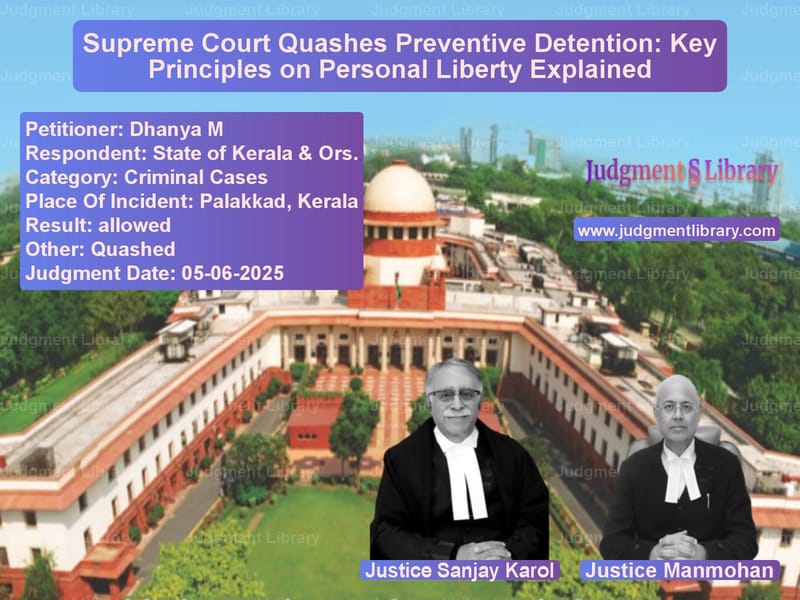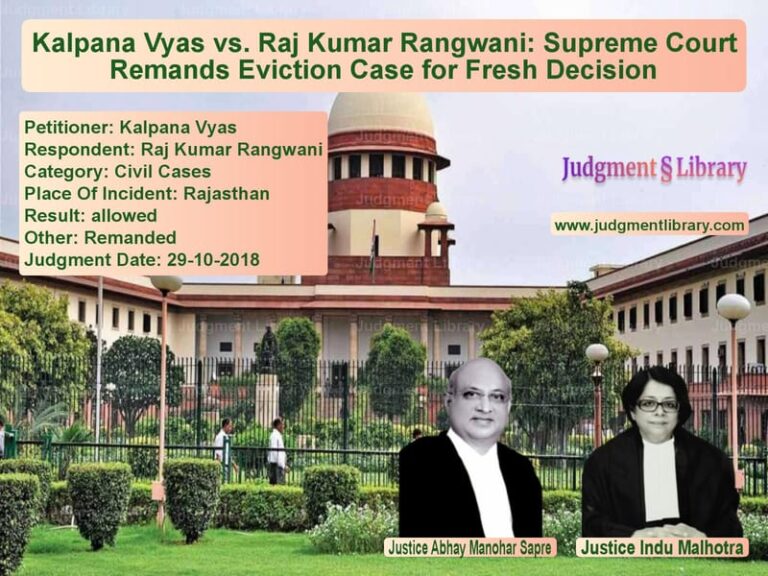Supreme Court Quashes Preventive Detention: Key Principles on Personal Liberty Explained
In a significant judgment reinforcing the constitutional protection of personal liberty, the Supreme Court of India has quashed the preventive detention of a money lender under the Kerala Anti-Social Activities (Prevention) Act, 2007. The judgment, delivered by a bench comprising Justice Sanjay Karol and Justice Manmohan, establishes crucial boundaries on the use of preventive detention powers by state authorities and emphasizes that this extraordinary power must be used sparingly and only in exceptional circumstances.
The Case Background
The case involved Rajesh, a money lender running a registered lending firm called ‘Rithika Finance’ in Palakkad, Kerala. On June 20, 2024, the District Magistrate of Palakkad issued an order of detention under Section 3(1) of the Kerala Anti-Social Activities (Prevention) Act, 2007, based on a recommendation from the Palakkad District Police Head. The detention order declared Rajesh as a ‘notorious goonda’ of the district and a threat to society at large.
The detention was based on four criminal cases registered against Rajesh. These included cases under the Kerala Money Lenders Act, 1958, the Kerala Prohibition of Charging Exorbitant Interest Act, 2012, various sections of the Indian Penal Code including Sections 294(b) (obscene acts and songs), 506(I) (criminal intimidation), 341 (wrongful restraint), 323 (voluntarily causing hurt), 324 (voluntarily causing hurt by dangerous weapons), 326 (voluntarily causing grievous hurt by dangerous weapons), and notably, Section 3(2), (va), 3(1)(r), 3(1)(s) of the SC/ST Prevention of Atrocities Act, 1989.
Rajesh’s wife, Dhanya M., filed a writ petition before the Kerala High Court challenging the detention order and seeking a writ of habeas corpus. However, the High Court dismissed the petition, holding that procedural safeguards had been complied with and that the court couldn’t sit in appeal against the detaining authority’s decision based on the materials placed before it.
The Supreme Court’s Legal Analysis
The Supreme Court began its analysis by emphasizing the extraordinary nature of preventive detention powers. The Court stated: “It is well settled that the provision for preventive detention is an extraordinary power in the hands of the State that must be used sparingly. It curtails the liberty of an individual in anticipation of the commission of further offence(s), and therefore, must not be used in the ordinary course of nature.”
The Court referred to its landmark decision in Rekha v. State of Tamil Nadu, emphasizing that “the power of preventive detention is an exception to Article 21 and, therefore, must be applied as such, as an exception to the main rule and only in rare cases.”
Quoting from its recent judgment in Mortuza Hussain Choudhary v. State of Nagaland and Ors., the Court elaborated: “Preventive detention is a draconian measure whereby a person who has not been tried and convicted under a penal law can be detained and confined for a determinate period of time so as to curtail that person’s anticipated criminal activities. This extreme mechanism is, however, sanctioned by Article 22(3)(b) of the Constitution of India. Significantly, Article 22 also provides stringent norms to be adhered to while effecting preventive detention.”
Distinction Between Law and Order vs Public Order
The Supreme Court made a crucial distinction between situations affecting ‘law and order’ and those affecting ‘public order’ – a distinction that became central to its decision. The Court referred to its judgment in SK. Nazneen v. State of Telangana, which emphasized this distinction and set aside detention orders that dealt with law and order situations rather than public order situations.
Quoting from Nenavath Buiji etc. v. State of Telangana & Ors., the Court explained: “The crucial issue is whether the activities of the detenu were prejudicial to public order. While the expression ‘law and order’ is wider in scope inasmuch as contravention of law always affects order, ‘Public order’ has a narrower ambit, and could be affected by only such contravention, which affects the community or the public at large. Public order is the even tempo of life of the community taking the country as a whole or even a specified locality.”
The Court further elaborated: “The distinction between the areas of ‘law and order’ and ‘public order’ is one of degree and extent of the reach, of the act in question on society. It is the potentiality of the act to disturb the even tempo of life of the community which makes it prejudicial to the maintenance of the public order. If a contravention in its effect is confined only to a few individuals directly involved as distinct from a wide spectrum of public, it could raise problem of law and order only.”
Application to the Present Case
Applying these principles to Rajesh’s case, the Supreme Court found that the facts and circumstances did not fall under the category of a public order situation. The Court observed: “The observations made in the detention order do not ascribe any reason as to how the actions of the detenu are against the public order of the State. As discussed above, given the extraordinary nature of the power of preventive detention, no reasons are assigned by the detaining authority, as to why and how the actions of the detenu warrant the exercise of such an exceptional power.”
The Court noted a significant procedural lapse: “Moreover, it has been stated therein by the authority that the detenu is violating the conditions of bail imposed upon him in the cases that have been considered for passing the order of detention. However, pertinently, no application has been filed by the respondent-State in any of the four cases, alleging violation of such conditions, if any, and moreover, have not even been spelt out here.”
Alternative Remedies Available
The Supreme Court emphasized that the State should have explored alternative remedies available under ordinary criminal law before resorting to preventive detention. The Court referred to its judgment in SK. Nazneen, which had observed that “the State should move for cancellation of bail of the detenu, instead of placing him under the law of preventive detention, which is not the appropriate remedy.”
Quoting from Ameena Begum v. State of Telengana, the Court stated: “It is pertinent to note that in the three criminal proceedings where the detenu had been released on bail, no applications for cancellation of bail had been moved by the State. In the light of the same, the provisions of the Act, which is an extraordinary statute, should not have been resorted to when ordinary criminal law provided sufficient means to address the apprehensions leading to the impugned detention order.”
The Court particularly emphasized the observations from Vijay Narain Singh v. State of Bihar: “It is well settled that the law of preventive detention is a hard law and therefore it should be strictly construed. Care should be taken that the liberty of a person is not jeopardised unless his case falls squarely within the four corners of the relevant law. The law of preventive detention should not be used merely to clip the wings of an accused who is involved in a criminal prosecution. It is not intended for the purpose of keeping a man under detention when under ordinary criminal law it may not be possible to resist the issue of orders of bail, unless the material available is such as would satisfy the requirements of the legal provisions authorising such detention.”
Court’s Final Ruling
The Supreme Court concluded that the detention order could not be sustained. The Court held: “Keeping in view the above expositions of law, we have no doubt that the order of detention cannot be sustained. The circumstances pointed out in the order by the detaining authority may be ground enough for the State to approach the competent Courts for cancellation of bail, but it cannot be said that the same warranted his preventive detention.”
The Court clarified that if the State wished to pursue the matter, it could still approach the competent courts for cancellation of bail, and such application should be decided uninfluenced by the observations in this judgment.
The Supreme Court set aside both the detention order dated June 20, 2024, and the High Court’s judgment dated September 4, 2024, allowing the appeal. Notably, the Court mentioned that Rajesh had already been released on December 10, 2024, since the maximum period of detention under the Act (six months) had been completed.
Legal Significance and Impact
This judgment reinforces several fundamental principles of constitutional law regarding preventive detention. First, it reiterates that preventive detention is an extraordinary power that must be used sparingly and only in exceptional circumstances. Second, it emphasizes the crucial distinction between law and order situations and public order situations, clarifying that preventive detention is meant only for the latter. Third, it establishes that states must exhaust remedies under ordinary criminal law before resorting to preventive detention statutes.
The judgment serves as an important safeguard against the potential misuse of preventive detention laws to circumvent the ordinary criminal justice system. It ensures that these draconian measures are not used merely because the state finds it difficult to secure conviction or cancellation of bail through regular legal channels. The decision maintains the delicate balance between state power to prevent crime and the fundamental right to personal liberty protected under Article 21 of the Constitution.
This precedent will guide lower courts and detaining authorities in future cases, ensuring that preventive detention remains truly preventive rather than punitive, and is used only when there is a genuine threat to public order that cannot be addressed through ordinary legal mechanisms.
Petitioner Name: Dhanya M.Respondent Name: State of Kerala & Ors..Judgment By: Justice Sanjay Karol, Justice Manmohan.Place Of Incident: Palakkad, Kerala.Judgment Date: 05-06-2025.Result: allowed.
Don’t miss out on the full details! Download the complete judgment in PDF format below and gain valuable insights instantly!
Download Judgment: dhanya-m-vs-state-of-kerala-&-or-supreme-court-of-india-judgment-dated-05-06-2025.pdf
Directly Download Judgment: Directly download this Judgment
See all petitions in Bail and Anticipatory Bail
See all petitions in Judgment by Sanjay Karol
See all petitions in Judgment by Manmohan
See all petitions in allowed
See all petitions in Quashed
See all petitions in supreme court of India judgments June 2025
See all petitions in 2025 judgments
See all posts in Criminal Cases Category
See all allowed petitions in Criminal Cases Category
See all Dismissed petitions in Criminal Cases Category
See all partially allowed petitions in Criminal Cases Category







